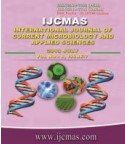


 National Academy of Agricultural Sciences (NAAS)
National Academy of Agricultural Sciences (NAAS)

|
PRINT ISSN : 2319-7692
Online ISSN : 2319-7706 Issues : 12 per year Publisher : Excellent Publishers Email : editorijcmas@gmail.com / submit@ijcmas.com Editor-in-chief: Dr.M.Prakash Index Copernicus ICV 2018: 95.39 NAAS RATING 2020: 5.38 |
Blended guava ‘Allahabad Safeda’ and papaya ‘Taiwan Red Lady’ fruit leathers were prepared by blending their pulp at different ratio of 100:0, 80:20, 60:40, 50:50, 40:60, 20:80 and 0:100 respectively. Acidity at 0.3 % using citric acid and KMS (potassium metabisulphite) at 600 ppm was added to blended pulp and TSS adjusted to 20oB then dried in a cabinet drier at 55 ± 5oC till the desired moisture content (15 % approx.) is achieved. Blended guava-papaya (40:60) leather was found best among other treatments in terms of quality and acceptability. It had a good yield of 26.78 % with 15.75 % moisture content and 0.59 water acidity which promises a good storability and safety. It was highly acceptable with maximum sensory acceptability in terms of colour, flavor and texture (total 80.78 out of 100) with acidity 1.22 %, reducing sugar 39.44 %, non-reducing sugar 29.41 % and total sugar 68.85 %. It improved the nutritional value with 137.3 mg per 100g ascorbic acid and 1367.3 µg carotenoids per 100 g of prepared leather. Non enzymatic browning (NEB) measured at optical density at 420 nm had 0.124 reading which was far below unacceptable level.
 |
 |
 |
 |
 |